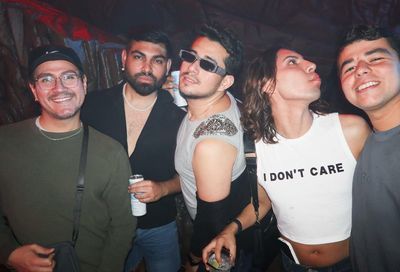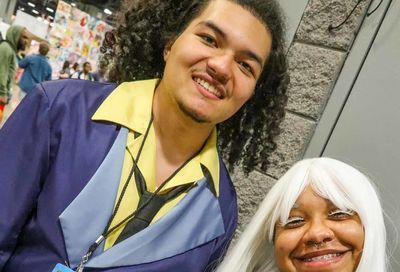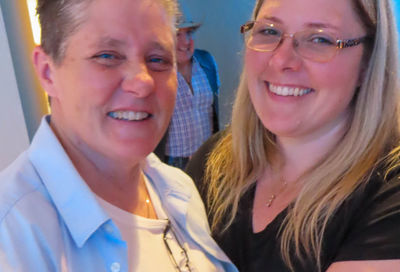Back to School
Learning Curve
I recently came out to over one hundred kids at my old high school. I was invited to do so as the loyal and enthusiastic alum of an extraordinarily progressive Quaker school, Carolina Friends (CFS), which since its founding in the early 1960s has affirmed difference. Posing for snapshots with the young students now involved in a gay-straight alliance and teachers who work patiently with “different” kids, I had the pleasurable choked-up feeling of coming home.
Based in Durham, North Carolina, CFS originated in 1963 as an alternative to the institutionalized racial segregation in surrounding schools. By the time I enrolled as an eleven-year-old in the tie-dyed year of 1972, the school had several gay and lesbian teachers, who were much loved and whose visibility generated no controversy. You had to be committedly counter-cultural at CFS in those years; all of us were aware that the school, in general, was perceived as a haven for “weirdos” by our conservative neighbors.
|
Yet this ingathering of changemakers made possible a curriculum based on tolerance, ideological commitment, and in the best Quaker tradition, nonviolence. Gaybashings were unknown on our secluded rural campus, beyond bad jokes about “mo’s” in my middle school carpool. When I grew infatuated with a female classmate at age sixteen and tried to subdue my feelings by pulling away from her, a wise (and happily married) older woman teacher told me, “But it can be just as hard to break up with a girl as with a guy. Don’t you need extra hugs?”
I knew I had to learn more, and that spring of 1978 I borrowed a multi-speed bike from one of the school’s trustees and rode long miles into Chapel Hill to attend the Southeastern Gay and Lesbian Conference at the University of North Carolina. I was the only high school student at the lesbian forum, and when kindly older women asked if I was gay, I stammered out “Not yet.” Afraid to commit, I nonetheless benefited greatly from CFS’s decision to bring in gay and lesbian speakers and performances.
In contrast to what we were exposed to, I should point out that during this same year the Briggs Initiative was introduced in the California legislature — a serious proposal to prohibit anyone homosexual from teaching school. We CFS kids had our off days, skipping class to go play in Duke Gardens or rebelling against genetics homework, but we felt a heightened appreciation for the programs made available to us. Our public school peers sure weren’t gaining the same insights.
I graduated from CFS in 1979, and came out as a lesbian at American University here in D.C. just eleven months later. In the years since, I’ve kept in touch with my beloved school by frequently driving the four-and-a-half hours south to give talks or guest-teach classes. One reason CFS is an island of gender tolerance amid Southern football culture is because the school began in the anti-Vietnam War era, with honor accruing to men who resisted the draft for reasons of conscientious objection. Across two generations, CFS has allowed young men to model behaviors that favor a different kind of masculinity, one not based on sheer hierarchical or athletic power or the belittling of women.
Mainstream ideals of heroism had a different shape at CFS: our teachers were activists and war resisters willing, on occasion, to go to jail for their beliefs. These strengths were the norm, and sports competition a lesser priority. Instead, the school produced an astounding number of arts superstars, with young men excelling in dance, drama, and musical instruments. We girls were also passionately involved in the performing arts, but invited to learn carpentry, too — in fact, mandatory “school service” could be completed, in my olden days, by road repair or the ongoing construction of solar showers on campus. In short, gender roles were fluid. What mattered, if I may be allowed to characterize Quaker philosophy with Jewish slang, was to become a “mensch” — a decent human being.
I’m proud to be a graduate who can put a familiar face on what it looks like to be a happy lesbian grown-up. One time I was barely on campus fifteen minutes when a fourteen-year-old girl asked, “Um, are you family?” I chuckled at the code word she extended, like a handshake, to a graying but lambda-wearing alum. She helped me remember that students like us, who feel an unmistakable gay or lesbian orientation during high school, get caught between the chance to be proudly out and the need for other visiting role models. I sat through the late 1970s guest talks by gay artists never dreaming I’d be the guest in the 21st century. But unlike many folks who came out young, my knees don’t shake when I walk back into those rooms where I took the PSAT exams. The building smells the same, thank God: the scent of a warm welcome.
Bonnie J. Morris, Ph.D., is on the women’s studies faculty at George Washington University and Georgetown University. She can be reached at bmorris@metroweekly.com.
Support Metro Weekly’s Journalism
These are challenging times for news organizations. And yet it’s crucial we stay active and provide vital resources and information to both our local readers and the world. So won’t you please take a moment and consider supporting Metro Weekly with a membership? For as little as $5 a month, you can help ensure Metro Weekly magazine and MetroWeekly.com remain free, viable resources as we provide the best, most diverse, culturally-resonant LGBTQ coverage in both the D.C. region and around the world. Memberships come with exclusive perks and discounts, your own personal digital delivery of each week’s magazine (and an archive), access to our Member's Lounge when it launches this fall, and exclusive members-only items like Metro Weekly Membership Mugs and Tote Bags! Check out all our membership levels here and please join us today!






















